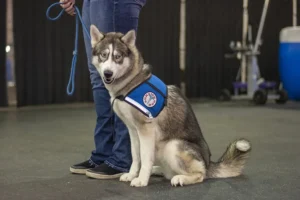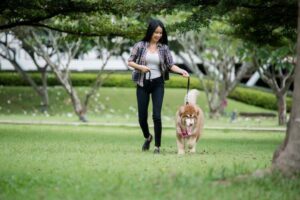As professional dog trainers at Sit Now Stay Dog Training in Kansas City, KS, we often encounter dogs who display leash reactivity. This behavior can be stressful for both the dog and the owner, but with the right techniques and training programs, it is possible to manage and reduce these reactions. At Sit Now Stay, we offer various programs including Private Lessons, Day School, Boarding School, and Puppy Training to help mold your dog’s behavior and enhance your bond.

Understanding Leash Reactivity
Leash reactivity refers to a dog’s tendency to overreact to stimuli such as other dogs, people, or vehicles while on a leash. This overreaction can manifest as barking, lunging, growling, or even biting. It’s essential to understand that leash reactivity is often a result of fear, frustration, or excitement, and not necessarily aggression.
Techniques for Managing Leash Reactivity
- Stay Calm and Consistent
Dogs can sense our emotions. Staying calm and composed during walks helps set a positive tone for your dog. Consistency in your reactions and commands will also help your dog understand what is expected of them. - Desensitization and Counter-Conditioning
Gradually exposing your dog to the trigger (other dogs, people, etc.) at a distance where they are comfortable and rewarding them for calm behavior can help reduce reactivity. Over time, decrease the distance while continuing to reward positive behavior. - Redirecting Attention
Teach your dog to focus on you instead of the trigger. Commands like “watch me” or “look” can be helpful. Reward your dog with treats or praise when they successfully focus on you. - Use of Positive Reinforcement
Rewarding your dog for calm behavior reinforces that this is the desired response. Treats, toys, and praise are excellent motivators. - Teach Alternative Behaviors
Training your dog to perform alternative behaviors like sitting or walking away from the trigger can help manage reactivity. Commands such as “sit,” “stay,” or “heel” can be useful in redirecting your dog’s energy.
Our Training Programs at Sit Now Stay
At Sit Now Stay Dog Training, we offer tailored programs to address leash reactivity and other behavioral issues:
- Private Lessons
One-on-one sessions with a trainer to address specific concerns and develop a customized training plan. - Day School
Drop your dog off for a day of training and socialization with other dogs, under the supervision of our experienced trainers. - Boarding School
An intensive training program where your dog stays with us for an extended period, receiving daily training sessions and socialization opportunities. - Puppy Training
Early training for puppies to prevent the development of reactivity and other behavioral issues. This program focuses on socialization, basic commands, and housebreaking.
Conclusion
Dealing with leash reactivity requires patience, consistency, and the right techniques. At Sit Now Stay Dog Training, we are committed to helping you and your dog overcome these challenges through our various training programs. Whether you choose Private Lessons, Day School, Boarding School, or Puppy Training, our experienced trainers will work with you to mold your dog’s behavior and improve your walks together.
If you’re in the Kansas City, KS area and need help managing your dog’s leash reactivity, contact us at Sit Now Stay Dog Training. Together, we can transform stressful walks into enjoyable adventures for you and your furry friend.




